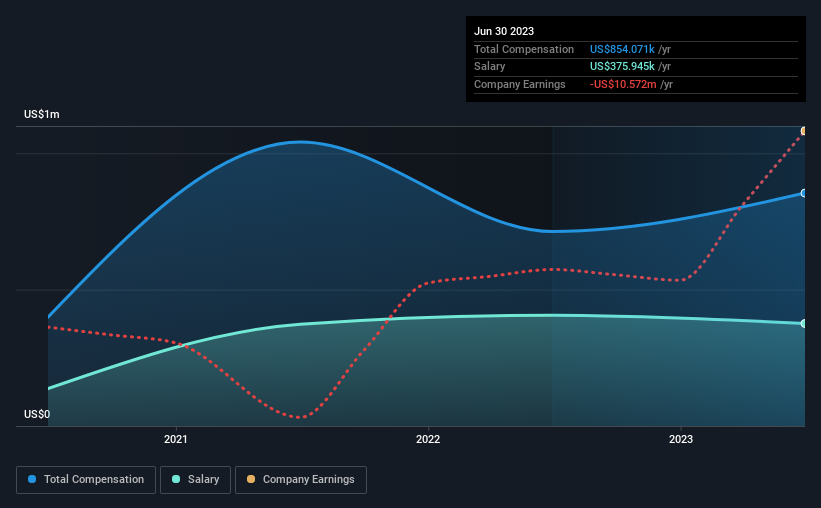This Is The Reason Why We Think Paladin Energy Ltd's (ASX:PDN) CEO Might Be Underpaid
Key Insights
Paladin Energy's Annual General Meeting to take place on 15th of November
CEO Ian Purdy's total compensation includes salary of US$375.9k
The overall pay is 62% below the industry average
Paladin Energy's EPS grew by 33% over the past three years while total shareholder return over the past three years was 647%
Shareholders will be pleased by the impressive results for Paladin Energy Ltd (ASX:PDN) recently and CEO Ian Purdy has played a key role. At the upcoming AGM on 15th of November, they will get a chance to hear the board review the company results, discuss future strategy and cast their vote on any resolutions such as executive remuneration. Let's take a look at why we think the CEO has done a good job and we'll present the case for a bump in pay.
See our latest analysis for Paladin Energy
Comparing Paladin Energy Ltd's CEO Compensation With The Industry
At the time of writing, our data shows that Paladin Energy Ltd has a market capitalization of AU$2.8b, and reported total annual CEO compensation of US$854k for the year to June 2023. We note that's an increase of 20% above last year. While this analysis focuses on total compensation, it's worth acknowledging that the salary portion is lower, valued at US$376k.
In comparison with other companies in the Australian Oil and Gas industry with market capitalizations ranging from AU$1.6b to AU$5.0b, the reported median CEO total compensation was US$2.2m. In other words, Paladin Energy pays its CEO lower than the industry median. What's more, Ian Purdy holds AU$4.8m worth of shares in the company in their own name, indicating that they have a lot of skin in the game.
Component | 2023 | 2022 | Proportion (2023) |
Salary | US$376k | US$406k | 44% |
Other | US$478k | US$307k | 56% |
Total Compensation | US$854k | US$713k | 100% |
On an industry level, roughly 62% of total compensation represents salary and 38% is other remuneration. In Paladin Energy's case, non-salary compensation represents a greater slice of total remuneration, in comparison to the broader industry. If non-salary compensation dominates total pay, it's an indicator that the executive's salary is tied to company performance.
Paladin Energy Ltd's Growth
Over the past three years, Paladin Energy Ltd has seen its earnings per share (EPS) grow by 33% per year. In the last year, its revenue has collapsed effectively to zero.
This demonstrates that the company has been improving recently and is good news for the shareholders. The lack of revenue growth isn't ideal, but it is the bottom line that counts most in business. Moving away from current form for a second, it could be important to check this free visual depiction of what analysts expect for the future.
Has Paladin Energy Ltd Been A Good Investment?
Most shareholders would probably be pleased with Paladin Energy Ltd for providing a total return of 647% over three years. This strong performance might mean some shareholders don't mind if the CEO were to be paid more than is normal for a company of its size.
To Conclude...
Some shareholders will probably be more lenient on CEO compensation in the upcoming AGM given the pleasing performance of the company recently. In saying that, some shareholders may feel that the more important issues to be addressed may be how the management plans to steer the company towards sustainable profitability in the future.
CEO compensation is a crucial aspect to keep your eyes on but investors also need to keep their eyes open for other issues related to business performance. That's why we did some digging and identified 1 warning sign for Paladin Energy that you should be aware of before investing.
Arguably, business quality is much more important than CEO compensation levels. So check out this free list of interesting companies that have HIGH return on equity and low debt.
Have feedback on this article? Concerned about the content? Get in touch with us directly. Alternatively, email editorial-team (at) simplywallst.com.
This article by Simply Wall St is general in nature. We provide commentary based on historical data and analyst forecasts only using an unbiased methodology and our articles are not intended to be financial advice. It does not constitute a recommendation to buy or sell any stock, and does not take account of your objectives, or your financial situation. We aim to bring you long-term focused analysis driven by fundamental data. Note that our analysis may not factor in the latest price-sensitive company announcements or qualitative material. Simply Wall St has no position in any stocks mentioned.

